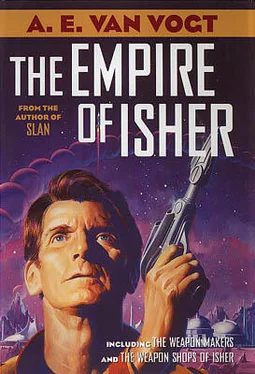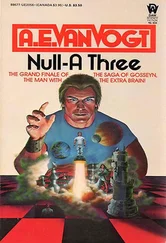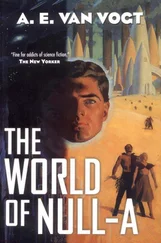It disturbed him. In Glay there had been a certain pleasure in defying the conventions. In Glay he had thought of himself as being “city.” Lying on the bed he knew that was true up to a point only. He lacked experience and knowledge, automatic response and awareness of dangers. His immediate plans must include remedies for these weaknesses. The vagueness of the purpose disturbed him. He had an uneasy feeling that he was making stop-gap decisions, that somehow he was not comprehending the main decision he must make one of these days.
He drifted into sleep, worrying about it. Twice, when he stirred on the edge of wakening, the thought was still there, unpleasant, urgent, a jarring background to his first night in the city of dreams. He awoke tired and unhappy. Only gradually did the uneasiness wear off.
He avoided the expensive automat, eating breakfast for a credit-eighth in a restaurant that offered personal service and featured “home” cooking. He regretted his miserliness. The weight of the indigestible meal on his stomach did not lighten until he was in the Penny Palace, an ornate gambling establishment on the world famous Avenue of Luck.
According to a guidebook which dealt exclusively with the avenue and its games, the Penny Palace owners “have put up glitter signs which modestly claim that it is possible for anyone to come in with a penny and walk out with a million, meaning, of course, a million credits.” Whether or not this good fortune has ever been achieved the signs do not indicate.
The write-up concluded generously, “The Penny Palace has the distinction of having more fifty-fifty games for the number of machines it has in operation than any other establishment on the Avenue of Luck.”
It was that plus the low stakes that interested Cayle. His immediate plans did not include walking out “with a million.” He wanted five hundred credits to begin with. After that—well, then he could afford to enlarge his horizon.
He laid his first bet on a machine that pumped the words odd and even into a swirling pool of light. When ten of each had been pumped into the pool the liquid-looking stuff suffered a chemical change, after which it would support only one of the words on its surface. All the others sank through a screen and vanished.
The winning words floated easily face up and somehow set in motion the paying mechanism or the collecting mechanism. The bettors either saw their bets vanish with a click or else their winnings would slide automatically to the square before which they stood. Cayle heard the click of defeat.
He doubled his bet and this time won. He withdrew his original stake, and played with the coin he had won. The intricate lights fused, the pump squished, then up floated the word even. The pleasant sound of money sliding softly toward him assailed Cayle’s ears. It was a sound that he was to hear often during the next hour and a half for, despite the fact that he played cautiously and only with pennies, he won just over five credits.
Tired at last he retreated to a connecting restaurant. When he came back into the “treasure room,” as it was called, he noticed a game that was played in an even more intimate fashion by the player himself.
The money went into a slot, releasing a lever, and when this was pulled a light sequence was set up. The movement was very rapid but it resolved swiftly into red or black.
The game was thus but another variation of the odd and even sequence, since the player had the same fifty-fifty chance of winning.
Cayle slipped a half-credit coin into the proper slot, pulled the activating lever—and lost. His second guess was equally wrong, and his third, also. The fourth time his color shimmered into place and he had his first win. He won the next ten straight, lost four, then won seven out of another ten series. In two hours, by playing carefully, limiting his luck rather than forcing it, he won seventy-eight credits.
He withdrew to one of the bars for a drink, and pondered his next move. So many things to do—buy a new suit, protect his winnings, prepare for another night and pay back the money Lucy Rail had loaned him.
His mind poised, titillated. He felt comfortable and very sure of himself. A moment later he was putting through a ’stat call to the weapon shop girl.
Making more money could wait.
She came in almost immediately. “I’m out on the street now,” she answered his request.
Cayle could see what she meant. Her face almost filled the screen. Extens-stats magnified from a tiny image. People used them on the street, keeping them connected with their home ’stats. One of the fellows in Glay had one.
Before Cayle could speak, the girl said: “I’m on my way to my apartment. Wouldn’t you like to meet me there?”
Would he!
Her apartment turned out to be a four room affair, unique only in the abundance of automatic devices. After a quick look around, it was clear to Cayle that Lucy Rail never did a stroke of housework. What puzzled him, however, was that the place seemed unprotected. The girl came out of her bedroom dressed for the street and shrugged at his comment.
“We weapon shop people,” she said, ‘live just like anyone else, usually in the nicer residential districts. Only our shops and—” she hesitated—“a few factories and, of course, the Information Center are protected from interference.”
She broke off. “You said something about buying a suit. If you wish I’ll help you select it. I’ve only two hours, though.”
Cayle held the door open for her, exhilarated. The invitation to her apartment must have a personal meaning. Whatever her duties for the weapon shops, they couldn’t possibly include inviting obscure Cayle Clark to her apartment, even if only for a few moments. He decided to assume that she was interested in him as an individual.
They took a carplane, Lucy pushing the button that brought the machine down to pick them up.
“Where are we going?” Cayle asked.
The girl smiled, and shook her head. “You’ll see,” she said. When they were in the plane, she pointed up. , “Look,” she said.
An artificial cloud was breaking out in the sky above. It changed colors several times, then vividly through it shone the letters: HABERDASHERY PARADISE.
Cayle said, “Why I saw their ad last night.”
He had forgotten but now he remembered. The streamers of lights had soared aloft the night before as he walked from the automat to his rooming house. Advertising Paradise. Informing males of every age that here was the place to buy, here the retail establishment that could furnish anything in men’s clothing any hour of the day or night, anywhere on earth, Mars or Venus and, for a trifling extra cost, anywhere in the inhabited Solar System.
The ad had been one of hundreds—and so, in spite of his need for clothes, the name didn’t remain in his memory.
“It’s a store worth seeing,” Lucy said.
It seemed to Cayle that she was enjoying his enjoyment. It made him feel a little naive— but not too much. What was important was that she was going with him. He ventured, “It’s so kind of you to help me.”
Haberdashery Paradise turned out to be more impressive than its ads. The building was three blocks long and eighty stories high. So Lucy told him; and added, “We’ll go to the main sections quickly, then buy your suit.”
The entrance to Paradise was a hundred yards wide, and thirty stories high. An energy screen kept the weather out but its doorless vastness was otherwise without barriers. It was easy to press through the harmless screen into the domed anteroom. The Paradise not only supplied beach clothing—it supplied a beach with a quarter of a mile of surging water tumbling from a misty horizon onto rich, tangy smell of the sea itself. Paradise not only supplied ski outfits, it supplied startlingly lifelike mountains with a twisting half-mile of snow-covered slope.
Читать дальше











